Dental Implants San Antonio
The Modern Day Answer to Tooth Loss

Dr. AJ always strives to offer his patients the best of the best when it comes to their treatment options. Dental implants in San Antonio are one of the most popular tooth replacement options because they’re the only treatment that restores both the roots and the visible surface of missing teeth. You can learn more about this procedure and whether you’re a good candidate for it by scheduling a consultation with Dr. AJ.
Why Choose Potranco Family Dental for Dental Implants?
- We Accept & Maximize All Dental Insurance Plans
- Dentist with Over a Decade of Experience
- Replacement Teeth That Look & Feel Lifelike
What Are Dental Implants?
Dental implants are typically crafted from titanium, which is a biocompatible metal, and are screw-like in shape. They’re designed to replace the missing roots of teeth by being secured into the jawbone and beneath the gumline. Due to their biocompatible nature, they’re able to fuse with the bone, offering an unwavering foundation for a free-standing crown, bridge, or denture to be secured to.
The 4-Step Dental Implant Process

Our team is able to handle every step of the dental implant process under one roof. We’ll make sure that you have a clear idea of what to expect; that way, you won’t have to worry about any surprises on your journey toward a re-completed smile. There are four main steps of getting dental implants, which are explained in more detail below. Feel free to let our team know if you have questions about any part of the process.
Initial Dental Implant Consultation
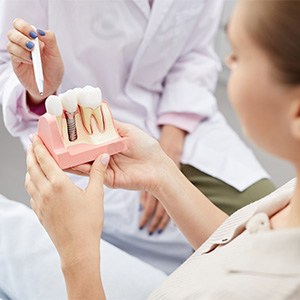
When you visit us for your initial consultation, we’ll take a close look at your mouth as well as your facial structure. Then we’ll help you figure out whether dental implants are a good choice for you. In some cases, we may find that bone grafting, gum disease treatment, or a different kind of preliminary procedure may be required before you can receive implant posts.
If you’re found to be a good candidate for dental implants, we’ll work with you to put together a treatment plan. Then, once the necessary preliminary work has been completed, we can move on to the next step of the process.
Dental Implant Surgery

Dental implant posts are meant to act as artificial tooth roots, which means they must be surgically inserted into the jawbone. To do so, your implant dentist in San Antonio will need to make a small incision in your gums. Rest assured that your mouth will be numbed for this procedure in order to keep you as comfortable as possible.
After the implant posts have been placed in precisely the right spots in your jaw, we will suture your gums shut. Then we will attach special caps to the implant posts to keep them safe while your mouth is healing.
Dental Implant Osseointegration & Abutment
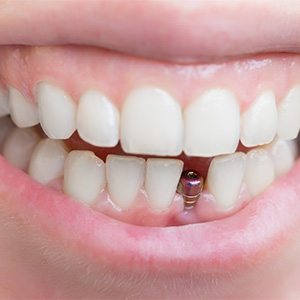
Once your dental implants are in place, you’ll need to wait for about three to six months. This is to give your implant posts time to form a lasting bond with the jawbone via osseointegration. We’ll give you tips for taking care of your mouth during this time in order to ensure that osseointegration is completed as expected.
Following a successful osseointegration process, abutments can be attached to your dental implant posts. The purpose of the abutments is to keep your replacement teeth anchored to the implants.
Delivery of Dental Implant Restoration(s)
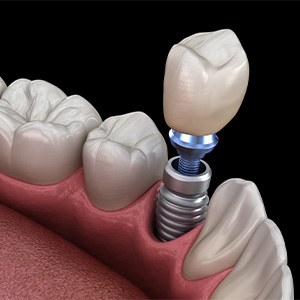
The final step is to design, create, and place the prosthesis that your dental implants will support. First, we’ll take an impression of your mouth to determine the right size and shape for your replacement teeth. Then the prosthesis will be created by a trusted dental laboratory before it’s sent to our office. Finally, we’ll schedule an appointment so that you can receive your completed crown, bridge, or denture. A last-minute check will be performed to make sure that the prosthesis fits as it should.
Benefits of Dental Implants

Dental implants are so popular because the benefits they offer are incredibly unique, making them the standout treatment option for patients. Not only will they provide you with replacement teeth that look and feel natural, but they can also restore up to 80% of your original bite power and keep your jawbone from deteriorating. To learn more about the benefits you will be able to enjoy with dental implants in San Antonio, continue reading the information below. You are also invited to schedule a consultation with Dr. AJ and our team so we can personally explain how this treatment might positively impact your life.
Day-to-Day Benefits

Dental implants may improve your daily life in a number of ways:
- Enhanced chewing ability: Dental implants allow you to eat all your favorite foods without restrictions because they provide a strong bite that mimics natural teeth.
- Easy maintenance: With dental implants, you can brush and floss easily just like you would with natural teeth.
- Confidence in appearance: Dental implants look lifelike and natural, giving you confidence in your smile. You also never have to worry about your teeth slipping out of place.
- Improved speech: Unlike dentures, dental implants do not move in the mouth, helping you speak clearly and confidently.
- Comfort and stability: Dental implants provide a stable and comfortable fit that lasts for many years.
Health Benefits

Dental implants have the potential to improve or support your oral and overall health in a few different ways:
- Jawbone preservation: Dental implants stimulate your jawbone. This can prevent bone loss and help your face to maintain its natural, youthful shape.
- Improved nutrition: With dental implants, you will be able to chew food more effectively, allowing you to enjoy a varied and nutritious diet. In turn, this may reduce your risk of various diseases.
- Benefits for remaining natural teeth: Dental implants do not usually require that the neighboring teeth be modified. Plus, they can serve as placeholders that prevent the natural teeth from drifting out of place.
- Improved emotional health: With a confident smile and the comfort of stable teeth, dental implants can significantly boost your self-esteem and overall emotional well-being.
Long-Term Benefits

Dental implants can start improving your life soon after your procedure, and they can continue to deliver benefits that last well into the future:
- Longevity: Dental implants have the potential to last an entire lifetime if they receive proper care.
- Monetary value: Although implants cost more upfront than traditional forms of tooth replacement, their cost per day over the long-term makes them an excellent value. In fact, they may even be a better value than traditional dentures!
- Lead a long and healthy life: Tooth loss is correlated with a shortened lifespan. Dental implants can address some of the issues that could shorten your life and may allow you to thrive for a very long time.
- High long-term success rate. Dental implant failure is quite rare, even many years after the initial placement procedure.
Who Dental Implants Can Help

Dental implants have already helped countless individuals throughout the San Antonio area to regain a complete and strong smile. Are you wondering if they might be able to help you as well? The good news is that almost all adults with missing teeth can qualify for this treatment! Continue reading below to learn more about the qualifications for dental implant candidates, as well as how dental implants can be used to address various levels of tooth loss.
Who Is a Good Candidate for Dental Implants?

Generally speaking, candidates for dental implants:
- Have good overall health. You should be well enough to undergo minor surgery.
- Are free of active gum disease. You should not have any oral health conditions, such as gum disease, that might interfere with the success of your implants.
- Have a healthy jawbone. Your jaw should be strong enough and large enough to support dental implants.
Keep in mind that even if you are not initially an ideal candidate for dental implants, you might become one after some preliminary care, such as a bone graft or gum disease therapy. We want as many people as possible to benefit from this treatment, and we will do all we can to formulate a plan that helps you restore your smile.
Missing One Tooth
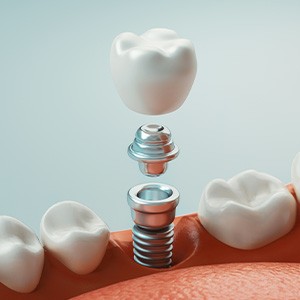
If you are missing just one tooth, our team can surgically place a single implant post into your jawbone. Over a period of a few months, it will bond with the surrounding tissue. Then, we can top it with a beautiful, custom-made crown.
A single dental implant is superior to a fixed dental bridge in a few ways. For example, it does not require that any of the nearby teeth be modified. Plus, an implant can stimulate the jawbone and help it to stay as strong and whole as possible.
Missing Multiple Teeth
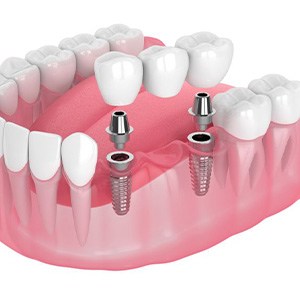
If you have two missing teeth in a row, we might place a single implant and top it with a crown. A pontic (artificial tooth) can be attached to the side of the crown in order to completely close the gap in your smile.
If you have three or more missing teeth in a row, we may place one implant at each end of the gap. The crowns on top of the implants can support multiple pontics between them.
But what if your missing teeth are not in a row? You might need a few single tooth implants or an implant-supported partial denture.
Missing All Teeth
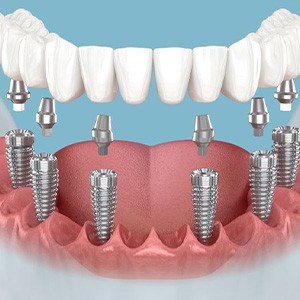
If you are completely edentulous (missing all teeth) in one or both of your dental arches, we may recommend that you receive an implant denture.
There are two main types of implant dentures. Fixed dentures are permanently attached to the posts that support them. In many ways, you can treat them just like natural teeth. A removable implant denture snaps onto and off of dental implants. Both options can provide a stable bite and reliable function. During your consultation, we can determine which one may best fit your circumstances.
Learn More About Implant Dentures Learn More About All-On-4 Dental Implants
Understanding the Cost of Dental Implants

The dental implant process can look very different for each patient based on their needs. As such, the cost of the treatment isn’t set in stone. Our implant dentist in San Antonio can give you an idea of what you can expect to pay once we’ve performed a thorough examination of your mouth. Remember, while dental implants may initially cost more than other forms of tooth replacement, the many benefits they offer make them well worthwhile in the long run!
Preliminary Treatments & Dental Implant Surgery
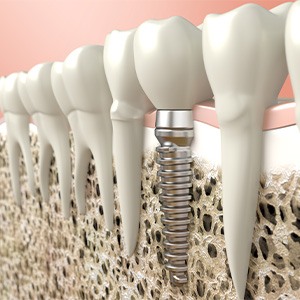
Depending on the state of your smile, you may need to have bone grafting, gum disease treatment, or other preliminary procedures performed before you can be considered a dental implant candidate. Naturally, these procedures will add to the overall cost of the dental implant process.
When it comes to the actual dental implant surgery, the amount you pay for it can be influenced by a number of factors. For example, it typically costs more to have a dental implant placed near the back of the mouth as opposed to the front.
The Parts of Your Dental Implant
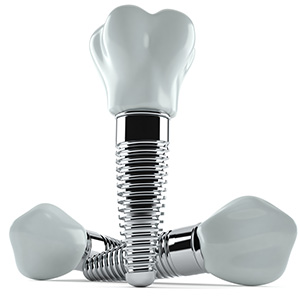
The price tag attached to your dental implants can vary based on:
- The exact number of implant posts that are needed to replace all of the teeth that you’ve lost.
- The type of prosthesis that your dental implants will support (which could be a crown, a bridge, or a denture).
- The materials that the implant posts and the prosthesis are made out of.
- The brand of dental implant used.
Our team will be more than happy to go over these factors in more detail with you and answer any questions you might have.
How Dental Implants Can Save You Money

Despite initially costing more than traditional bridges and dentures, dental implants can ultimately prove to be the wiser financial option. This is largely thanks to their longevity. As long as you take good care of your dental implants, you can potentially keep them for decades. As such, you don’t need to worry about paying to have them replaced every few years.
Does My Dental Insurance Cover Dental Implants?

Many dental insurance plans will not pay for the actual dental implants, but they may still provide coverage for certain preliminary procedures or the final prosthesis. It’s worth reaching out to your dental insurance company to confirm the details of your plan. Our team is ready to file any necessary claims on your behalf in order to reduce the amount you need to pay out of pocket for the overall dental implant process.
Making Dental Implants Affordable

Dental insurance isn’t the only way patients can enjoy more affordable care at our office. We also work with two trusted third-party financing companies: CareCredit and Lending Club. If you sign up for a financing plan, you can break up the cost of the dental implant process into smaller monthly installments that won’t put as much strain on your budget.
Maintaining & Caring for Your Dental Implants

Even though dental implants in San Antonio are very durable and have a high success rate, you still need to take care of them to ensure that they’re able to last as long as possible. Luckily, many of the steps you already follow to care for your natural teeth can also go a long way toward protecting your dental implants. Below, you can learn more about the basics of dental implant maintenance.
Make Oral Hygiene a Priority

Gum disease is one of the leading causes of dental implant failure. If you want to maximize the lifespan of your dental implants, you need to be able to keep your gums healthy – and that means having a good oral hygiene routine. When brushing, don’t forget to clean the area around your dental implants and pay close attention to the point where your dental implant prosthesis meets the gums. Also, you should make flossing a daily habit, and don’t forget to rinse with mouthwash.
Eat a Healthy Diet

It’s important to be mindful of what you eat and how different foods can affect your dental implants. Consuming too many sugary or starchy foods can increase your risk for gum disease. On the other hand, foods that are high in vitamin C are good for your gums. Plan your diet carefully in order to maintain a healthy oral environment where your dental implants and your natural teeth can thrive.
Break Bad Habits

Do you ever start crunching the ice that’s left at the bottom of your glass when you finish a drink? Or do you have a tendency to chew on your fingernails when you’re anxious? These types of habits can end up damaging your dental implants in the long run. The best way to protect your smile is to break these habits as soon as possible. There may be steps you can take to make the change easier; for example, carrying sugar-free gum is often an effective method for dealing with the urge to chew on something.
Protect Your Dental Implants

Do you grind your teeth at night? If so, you should invest in a nightguard. That way, you can keep your dental implants safe from the damage that they might otherwise suffer from repeated grinding and clenching. Additionally, if you participate in sports, it’s recommended that you wear a mouthguard regardless of whether you’re required to. This simple oral appliance can help protect your dental implants from the worst of the impact if you happen to get hit in the mouth or face.
Schedule Regular Dental Checkups

Even after you get dental implants, your biannual dental checkups and cleanings will remain as important as ever. Our team can take a look at your dental implants and the prosthesis they support to confirm that there aren’t any issues. We’ll let you know if there are any problems that need to be dealt with before they can put your restored smile at risk.
Dental Implant FAQs
How Long Do Dental Implants Last?
As you can probably guess, the exact answer to this question is different for every patient. That being said, it’s not uncommon for dental implants to last more than three decades, and plenty of people are able to keep the same implant posts for the rest of their lives.
If you want to maximize the lifespan of your dental implants, you need to take proper care of them. This means brushing, flossing, and rinsing with mouthwash every day. On top of that, you should also make a point of staying away from hard or sticky foods that can potentially damage dental implants. And of course, you should make a point of visiting your dentist at least twice a year for a routine dental checkup so that they can see if there are any problems developing with your dental implants.
How Successful are Dental Implants?
While dental implants haven’t been around as long as traditional bridges and dentures, they have been proven to be a highly successful form of tooth replacement. In fact, they maintain a success rate of over 95% even 10 years after their initial placement. Of course, dental implant failure can still occur if the tissues supporting your dental implants become infected. This is why it’s essential to be able to maintain excellent oral hygiene habits once your dental implants have been inserted into your jaw.
Am I Too Old to Get Dental Implants?
While dental implants are not recommended for younger patients with still-developing jaws, there actually isn’t an upper age limit for the procedure. Sometimes it’s possible to still be a viable dental implant candidate even in your 80s. This is because the amount of bone density in your jaw and the overall health of your mouth are what will ultimately determine whether you’re able to undergo dental implant surgery.
However, it is worth noting that older patients typically have a higher chance of experiencing health complications that could get in the way of the dental implant process. Your implant dentist will need to conduct a thorough review of your health history in order to confirm whether dental implants are right for you.
Are Dental Implants an Eligible FSA Expense?
You may have a flexible spending account (FSA) that you can use to help pay for a variety of dental expenses. Since dental implants are considered a restorative treatment, they are often eligible for FSA coverage. Of course, you will need to double-check the details of your account to confirm what it will and will not help pay for. Also, bear in mind that FSAs often set a limit on how much money you can spend on dental treatments in a given year.
What Can Cause Dental Implants to Fail?
Chronic teeth grinding, certain health conditions, and tobacco use are a few common causes of dental implant failure. That said, the two biggest culprits are peri-implantitis and failed osseointegration. Peri-implantitis is a form of gum disease that develops from poor oral hygiene, which is why incorporating healthy habits into your routine is so important. Failed osseointegration, on the other hand, is when the jawbone and implant don’t fuse together properly. Rest assured, we will cover all of this information (and a whole lot more) at your consultation to increase the chances of success and minimize the chances of failure.
Will I Have to Take Off Work for Dental Implant Surgery?
Unless you schedule your procedure on a Friday afternoon, you will likely need to take some time off work to recover. Ultimately, the number of days we recommend will depend on a few factors, including if any preliminary treatments are needed, if your job is physically demanding, and how many dental implants are needed to restore your complete, confident smile.
Can I Get Dental Implants If I Smoke?
It is possible. That said, it’s something we will need to seriously consider because tobacco use is linked to a higher rate of dental implant failure. At the very least, you will need to refrain from smoking for at least two weeks prior to the procedure as well as two months afterward.
Important reminder: If you’ve had trouble quitting in the past, let us know! We aren’t here to judge. Rather, we want to share helpful recommendations to help you prepare and set you up for success.
